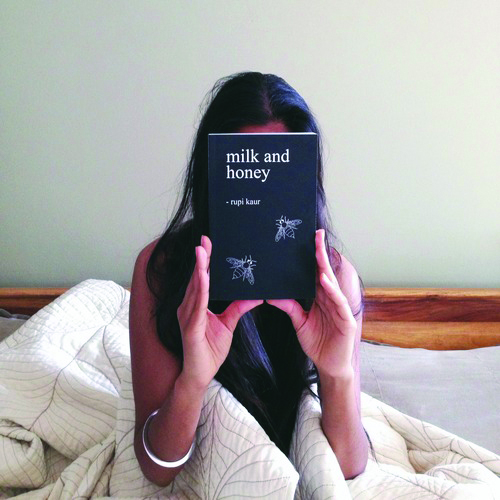By Jasmin Chahal (Contributor) – Email
Print Edition: February 4, 2015

“The thing about writing is / I can’t tell if it’s healing / or destroying me.” These were the words I met as I flipped open the pages of Rupi Kaur’s Milk and Honey for the first time. After seeing post after post on Instagram and Facebook about the author’s debut poetry collection, I couldn’t wait to get my hands on a copy and find out for myself what all the hype was about.
As an English major and creative writer, it’s always exciting to see poetry gaining attention among my generation. As the current top bestseller in Amazon’s poetry genre, the fact that it’s getting attention is the least that can be said about Milk and Honey. The astonishing popularity of this little black book may indicate that poetry, which is often seen as market-less by publishing companies, may be making its return.
More exciting still is the fact that the collection was published by a fourth-year undergrad student completing an English major. Perhaps I speak prematurely, but Rupi Kaur’s poetry may be a glimmer of hope for the rest of us starry-eyed creative writing majors.
Released last fall, Milk and Honey was the culmination of one year’s worth of writing shared online and through spoken word. As Rupi’s poems steadily gained attention on social media, so, too, did the demand for a book. Spanning nearly 200 pages, Milk and Honey explores the feminine experience of love, loss, trauma, and healing. The poems, often coupled with Rupi Kaur’s trademark illustrations, contain strength in their simplicity. Flipping through the pages, it quickly becomes apparent why her writing has taken a hold on so many. Using only the most necessary, hand-picked words, Rupi manages to cut to the depth of human emotion.
The success of Rupi’s style of writing is in the way it manages to speak to experiences that so many of us can connect to. Whether it’s the struggle to heal from past relationships or the struggle for self-love, each of us can find a piece of ourselves in Milk and Honey. Her poems often manage to read like miniature bundles of wisdom from an older sister. At other times, the vulnerability of her thoughts leave readers humbled that she chose to share such intimate parts of her past with them. It is a collection of writing that does exactly what its table of contents profess: it hurts, it loves, it breaks, and it heals.
If I have any particular criticism of the book, it is that I wish there was more. Each poem contains enough to leave the reader lost in thought, yet aching for another stanza as they flip to the next page. My second and third readings of the book were much slower than the first, as I was eager to unravel the writer’s thoughts now that I had read the collection cover to cover. The book’s greatest weakness being its length, all that I can ask is for a second collection.
Whether you are an avid reader of poetry or enjoy an occasional musing by Rumi, Milk and Honey is a great read and worth an order from Amazon.


